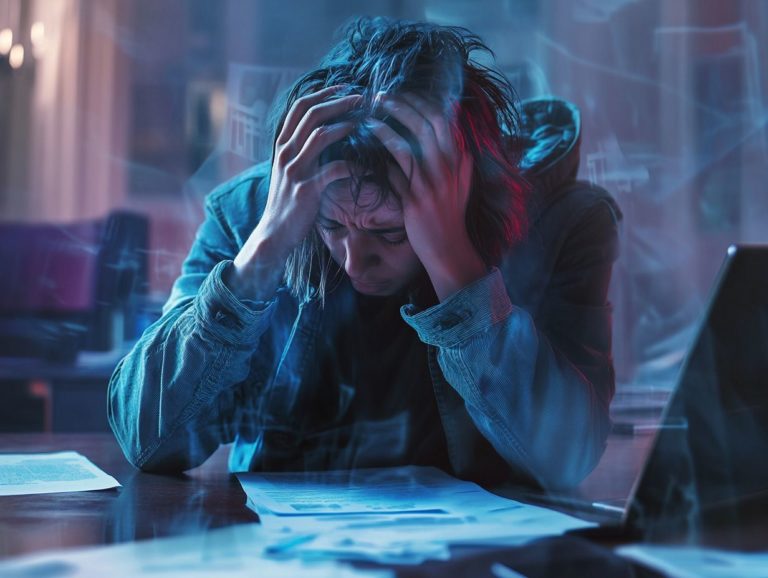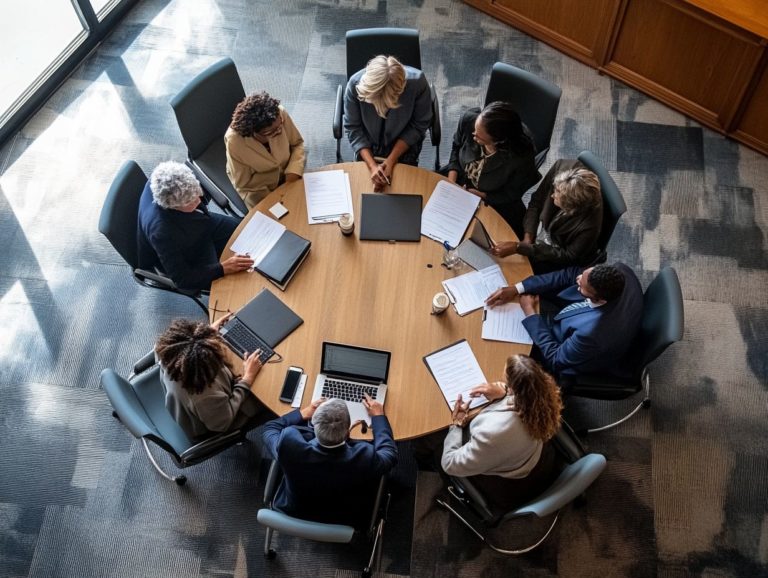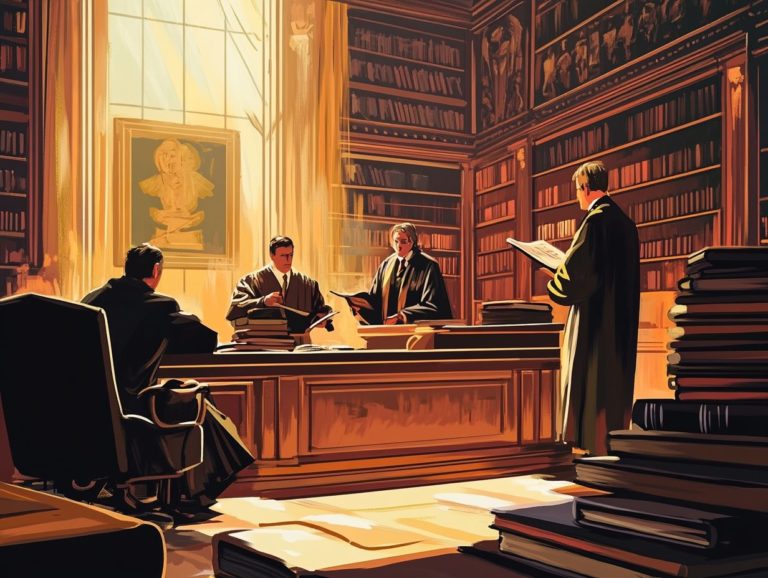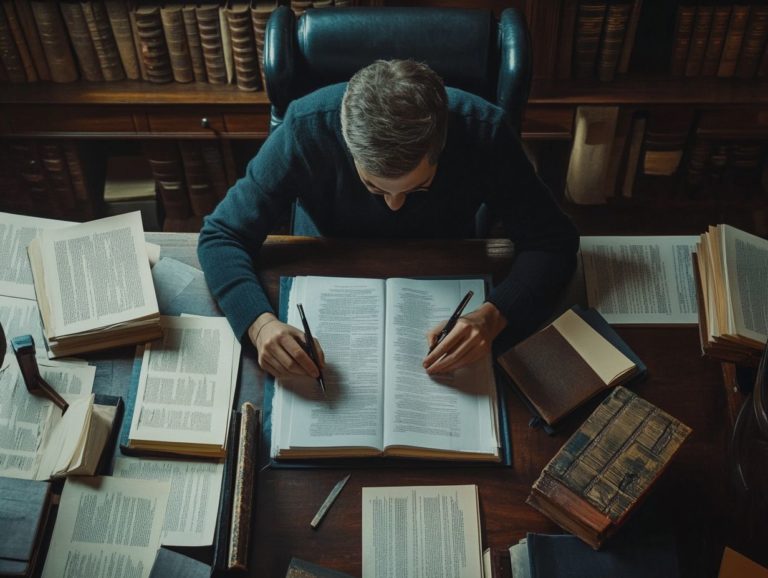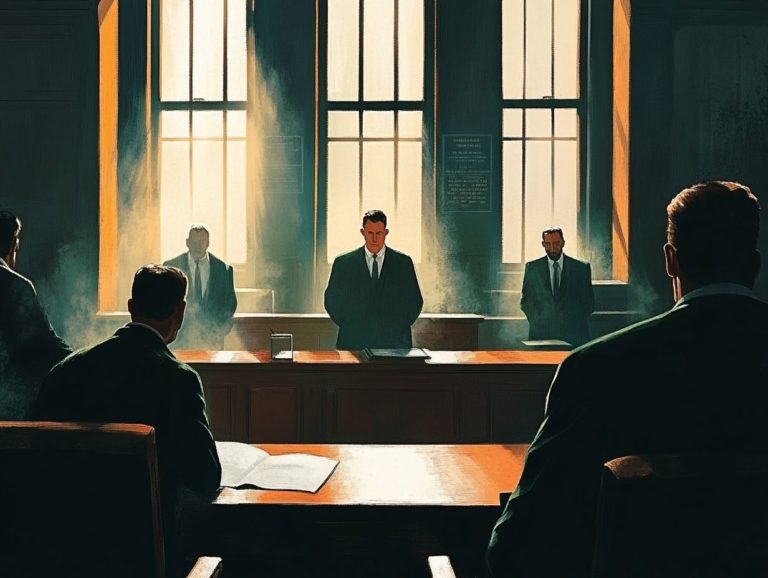What Is the Role of a Judge in Criminal Cases?
In the intricate world of criminal justice, judges hold a vital role that goes beyond merely presiding over court proceedings. They serve as guardians of the law, entrusted with interpreting statutes and ensuring fair trials.
Judges make critical decisions that significantly impact lives. Join us as we explore the vital responsibilities of judges and how their decisions shape our lives.
You will gain insight into the challenges judges encounter as they strive to balance justice with compassion, especially in high-profile cases.
Contents
- Key Takeaways:
- The Role of a Judge in Criminal Cases
- Responsibilities of a Judge
- The Decision-Making Process of a Judge
- The Impact of a Judge’s Decisions
- Challenges Faced by Judges in Criminal Cases
- Frequently Asked Questions
- What is the role of a judge in criminal cases?
- Does a judge play a role in determining guilt or innocence?
- Can a judge dismiss a criminal case?
- What other responsibilities does a judge have in a criminal case?
- Are judges required to be impartial in criminal cases?
- What happens if a judge is found to be biased in a criminal case?
Key Takeaways:
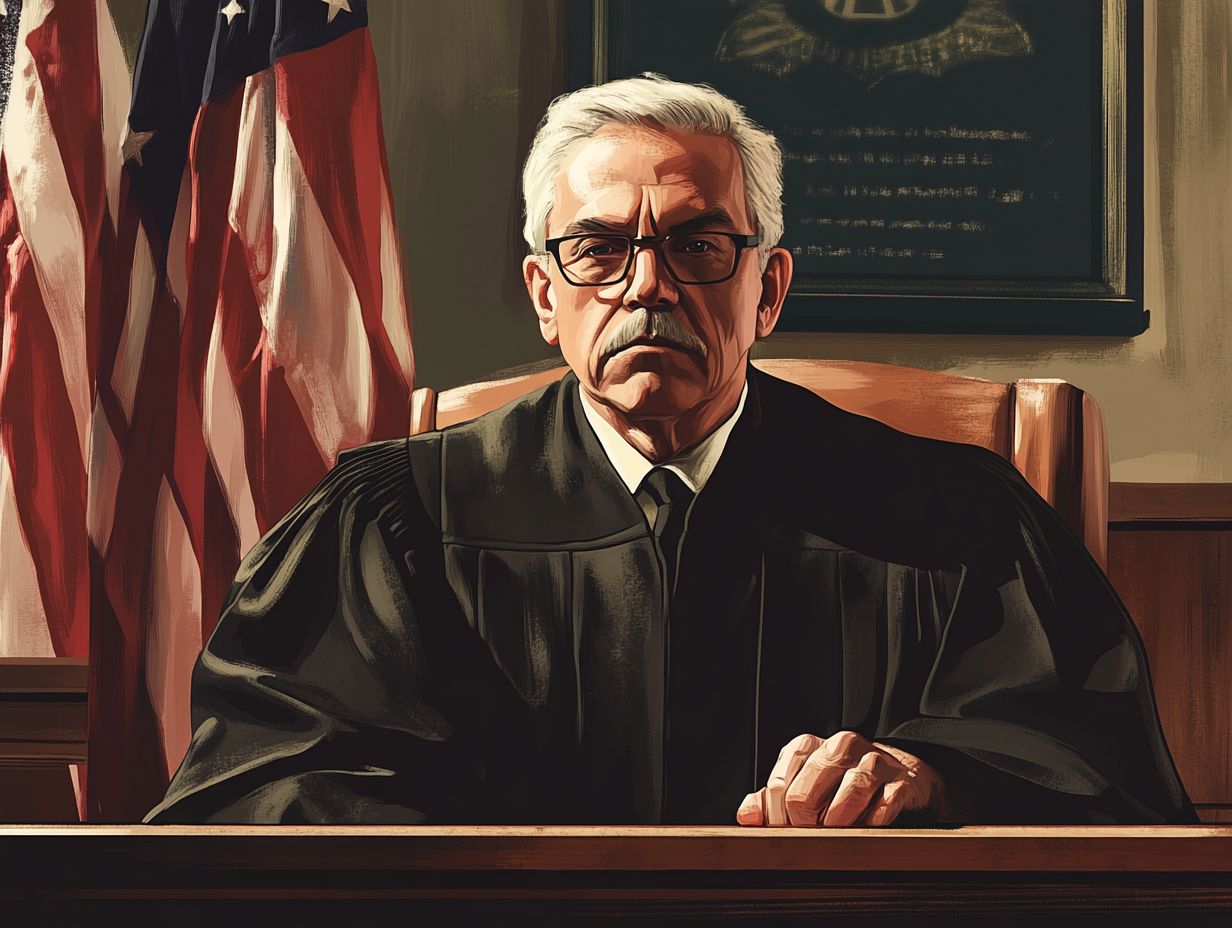
The Role of a Judge in Criminal Cases
The role of a judge in criminal cases is essential for ensuring justice within the U.S. judicial system. As a judge, you preside over courtroom proceedings, upholding judicial fairness at every turn.
You act as a neutral arbitrator and apply the law impartially, protecting the rights and legal requirements owed to all involved, especially criminal defendants.
This significant responsibility includes interpreting legal evidence, managing courtroom procedures, and making rulings on evidentiary objections. Each action plays a vital part in shaping the legal landscape of criminal justice.
Overview of the Judicial System
The U.S. judicial system is a complex framework designed to uphold the Constitution and protect your rights as a citizen.
At the pinnacle of this system lies the Supreme Court, the highest legal authority in the land. Beneath the Supreme Court, both federal and state courts hold crucial responsibilities in interpreting laws and addressing civil rights issues that resonate with individuals across the nation.
Federal courts handle cases involving federal laws, while state courts focus on violations of state laws and local matters. This dual structure ensures that you have multiple avenues for legal redress, safeguarding your individual liberties.
The Constitution and the Bill of Rights establish the legal principles that ensure your rights are upheld. Judicial independence is paramount; it allows judges to make impartial decisions without external pressures.
This independence is essential for maintaining the balance of power, which is critical for a fair judicial process.
Responsibilities of a Judge
Judges play a vital role in our justice system by interpreting laws and ensuring fairness. They carry critical duties that encompass presiding over court proceedings and safeguarding the rights of criminal defendants.
They navigate the complexities of the legal landscape with both authority and integrity. This includes interpreting and applying laws, which is fundamental to their duty.
Interpreting and Applying Laws
Interpreting and applying laws requires a thorough understanding of legal arguments, statutes, and precedents. These elements are essential when making informed decisions during courtroom management.
As a judge, you meticulously assess the legal evidence presented, weighing the reliability and relevance of each piece to uncover the truth. You must balance competing legal arguments while navigating the complex nuances that arise from each side’s presentation.
This judicial function is especially crucial in criminal trials, where the consequences can profoundly impact lives. By ensuring that every aspect of the trial adheres to the principles of justice, you uphold the integrity of the legal system.
Your decisions reflect fairness and accountability, safeguarding the rights of individuals within a structured framework.
Ensuring Fair and Impartial Trials
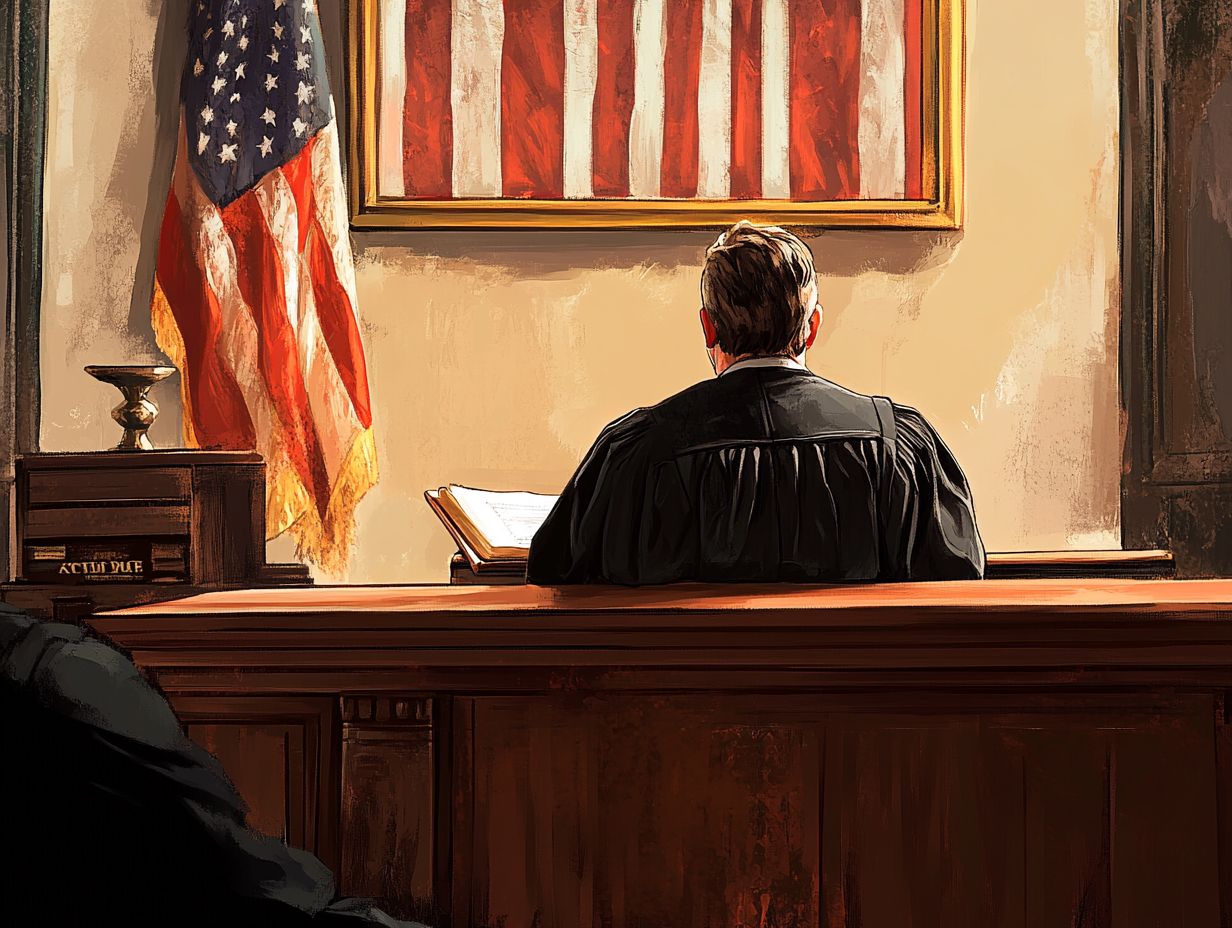
Judges act as impartial decision-makers. They ensure that every trial is fair, protecting your rights as a defendant while upholding justice.
This role goes beyond overseeing the courtroom. It includes giving clear jury instructions so jurors understand the legal standards they must apply.
Judges diligently manage courtroom proceedings. They promptly address evidentiary objections to maintain the trial’s integrity. Balancing the interests of both parties and remaining vigilant against bias underscores the importance of impartiality in the judicial process.
This commitment fosters public trust and confidence in legal outcomes. It ensures that justice is served without prejudice.
The Decision-Making Process of a Judge
The decision-making process of a judge is pivotal to the judicial function. It requires a thorough evaluation of evidence, careful consideration of witness testimonies, and a nuanced assessment of factors influencing legal rulings.
Each step is essential in ensuring that justice is served with precision and integrity.
Evaluating Evidence and Witness Testimonies
Evaluating evidence and witness testimonies is crucial for judges. You need to determine whether the evidence can be used in court and make important fact determinations for fair outcomes.
As you assess the credibility of witnesses and the reliability of evidence, several key criteria come into play. Factors include the consistency of testimonies, witness backgrounds, and potential biases.
The significance of evidentiary rules can’t be overstated. They provide a vital framework guiding your decisions on what can be included in court proceedings.
These rigorous assessments shape your decision-making process. The weight assigned to specific pieces of evidence can influence case outcomes and uphold the judicial system’s integrity.
Considering Mitigating and Aggravating Factors
When judges deliberate on sentencing, it’s essential to weigh both mitigating and aggravating factors. These elements critically shape outcomes and embody judicial fairness principles.
- Mitigating factors: Reasons that could lead to a lighter sentence, such as a defendant s clean slate, indications of mental health issues, or compelling personal circumstances.
- Aggravating factors: Reasons that could lead to a harsher sentence, like previous convictions or actions showing intent to inflict harm.
Judges must quickly strike the right balance between these opposing elements. This ensures that the sentence reflects the crime’s gravity and serves the broader interest of justice.
For instance, a first-time offender might benefit from a lighter sentence due to mitigating circumstances. In contrast, someone with a history of violence may face harsher penalties because of the aggravating factors in their case.
The Impact of a Judge’s Decisions
The influence of a judge’s decisions extends well beyond the courtroom. It profoundly affects the lives of criminal defendants, victims, and society at large.
Ultimately, these decisions play a pivotal role in shaping public perception of justice and the legal system itself.
Effects on the Accused, Victims, and Society
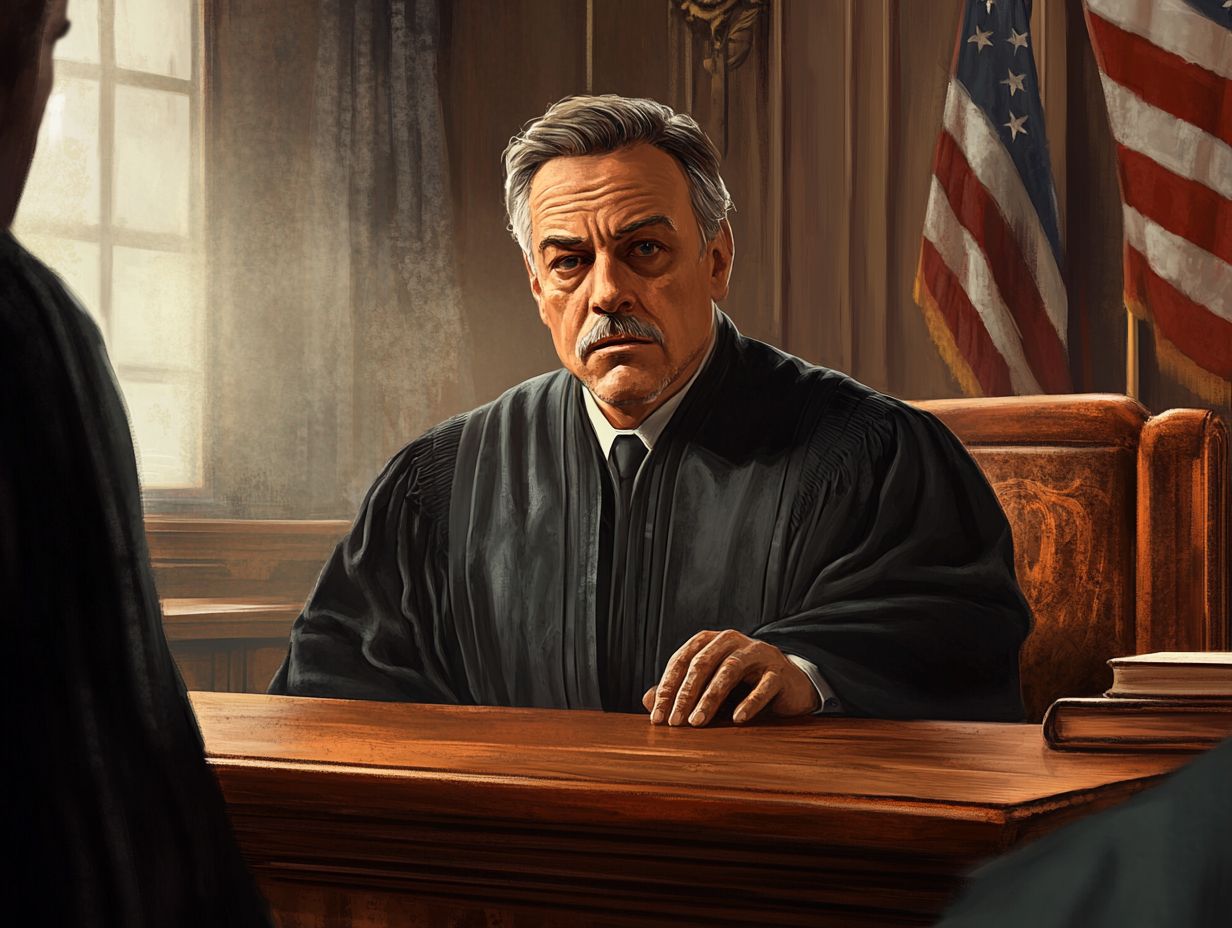
Judges’ rulings significantly influence the accused, victims, and society. They shape perceptions of the criminal justice system and impact public trust in legal institutions.
Consider this: when a judge opts for a lenient sentence for a convicted offender, it can create anger among victims’ families and the community. This response can ultimately erode confidence in the legal process.
If a judge imposes a stringent sentence, it may be viewed as excessively harsh, igniting debates surrounding rehabilitation versus punishment.
Judicial decisions on victim compensation can enable those seeking justice or leave them feeling overlooked, affecting community morale.
These ripple effects underscore the vital role each ruling plays not just in resolving individual cases but in shaping broader attitudes toward justice and accountability throughout society.
Challenges Faced by Judges in Criminal Cases
Judges encounter many challenges in criminal cases. They must skillfully manage courtroom procedures while upholding judicial fairness.
They also navigate the intricate complexities presented by each unique case.
Balancing Justice and Mercy
Balancing justice and mercy is challenging and important! You must weigh the legal implications of your sentencing decisions against the humanity of those involved.
This intricate process often plunges you into deep philosophical and ethical dilemmas.
You navigate your dual role not just as an enforcer of the law but also as someone who empathizes with the unique life circumstances of each individual.
For example, as a judge, you might grapple with the decision to impose a stringent penalty on a first-time offender while also considering broader social or psychological factors. These choices urge you to reflect on ideals such as fairness, rehabilitation, and the impact of your decisions on individuals.
This journey helps you understand justice in a deeper way!
Handling High-Profile or Controversial Cases
Handling high-profile or controversial cases presents unique challenges. You must navigate intense public scrutiny while ensuring courtroom management aligns with legal standards and principles of fairness.
The pressure in such cases can feel overwhelming. Relentless media coverage and the weight of public opinion can blur the lines of impartiality, even for the most seasoned jurists.
Under the microscope, every ruling you make can be seen as a reflection of your character.
To combat potential bias, you might adopt strategies like isolating case details from outside narratives, consulting with colleagues for diverse perspectives, and adhering to established legal frameworks. By prioritizing transparency in your decisions and maintaining open lines of communication with jurors, you strive to uphold the integrity of the judicial process.
Frequently Asked Questions
What is the role of a judge in criminal cases?
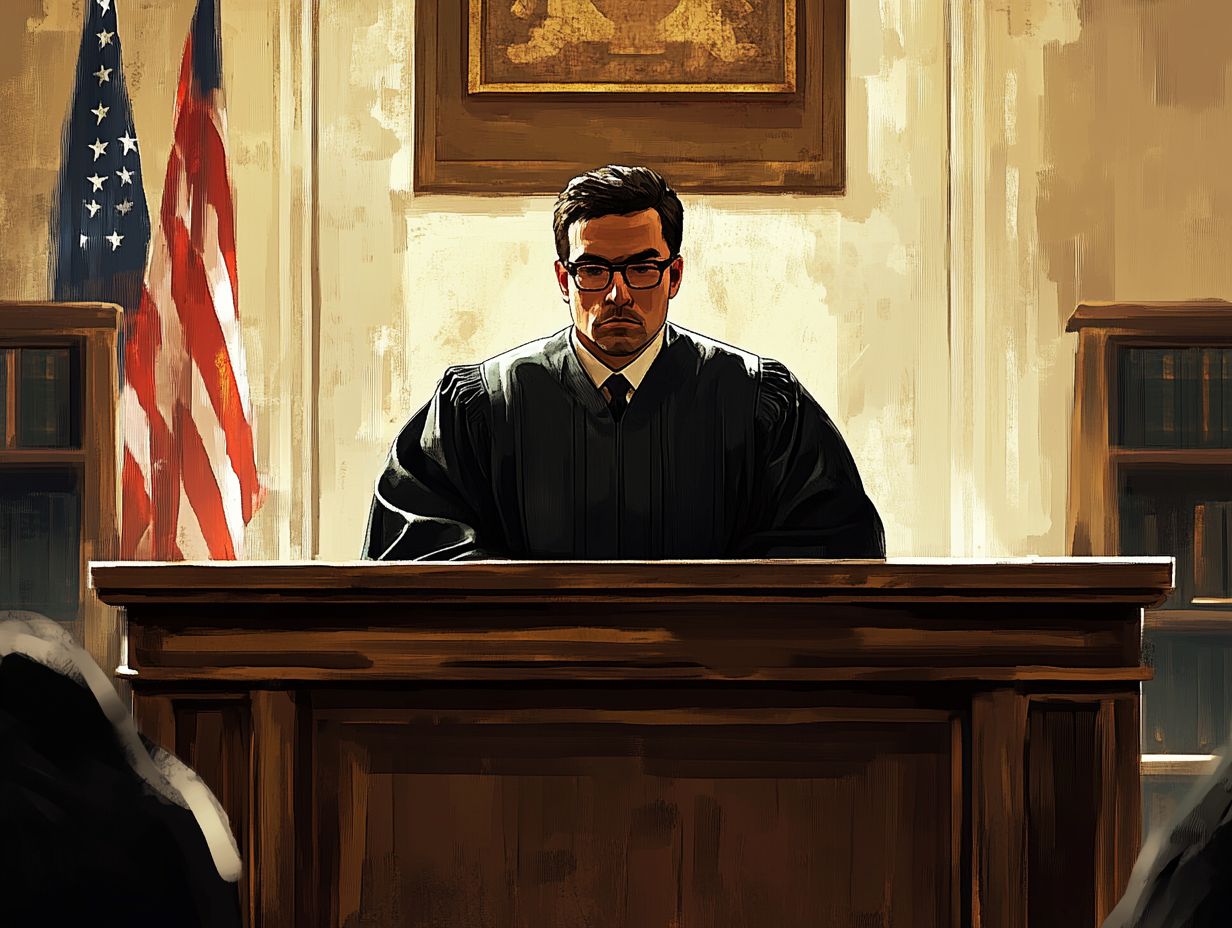
A judge s main job in criminal cases is to oversee the proceedings and make sure the law is followed. This includes making decisions on the admissibility of evidence and instructing the jury.
Does a judge play a role in determining guilt or innocence?
Yes, the judge has the final say in determining guilt or innocence in a criminal case. They must consider all evidence and apply the law to reach a conclusion.
Can a judge dismiss a criminal case?
Yes, a judge has the power to dismiss a criminal case if there is not enough evidence to support a conviction or if the defendant’s rights were violated during the investigation or trial.
What other responsibilities does a judge have in a criminal case?
In addition to determining guilt or innocence, a judge sets bail, determines the conditions of release for the defendant, imposes sentences for those found guilty, and oversees any plea negotiations between the prosecution and defense.
Are judges required to be impartial in criminal cases?
Yes, judges must be impartial. They are responsible for ensuring a fair trial for everyone involved.
What happens if a judge is found to be biased in a criminal case?
If a judge is biased, they may be recused (removed) from the case. A new judge will then be assigned, ensuring justice is served!

